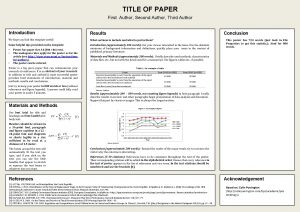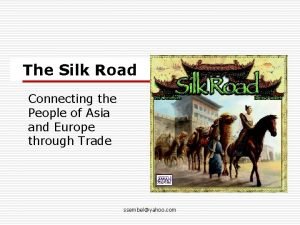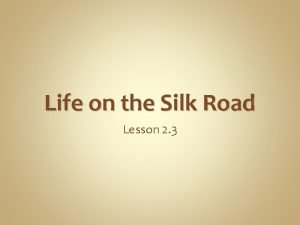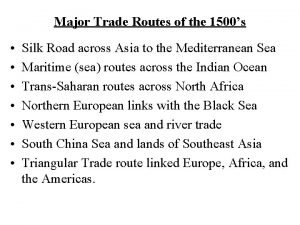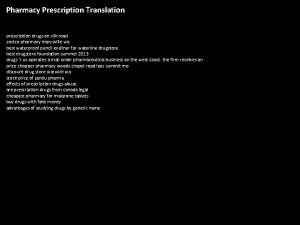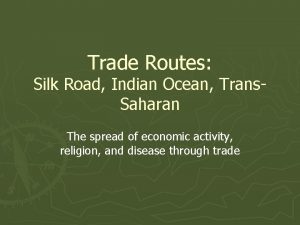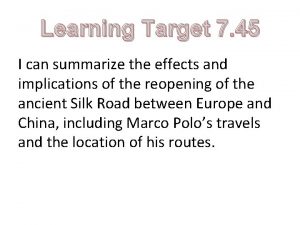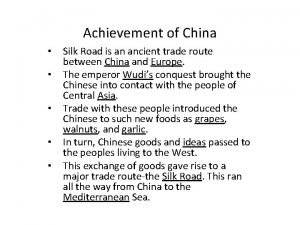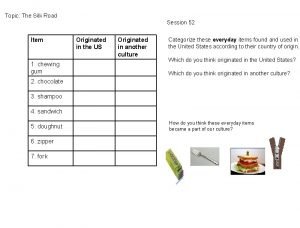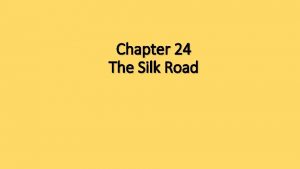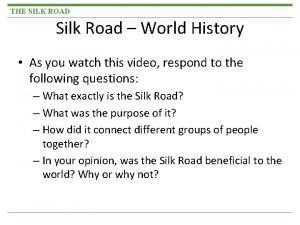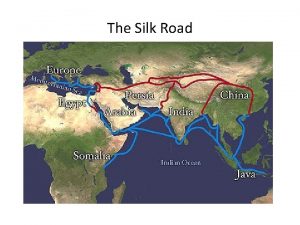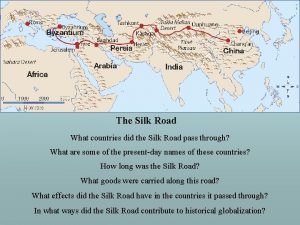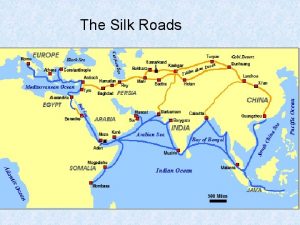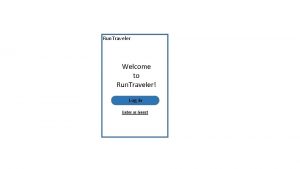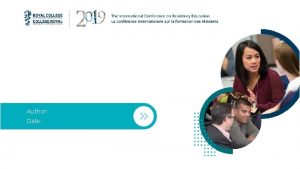A SILK ROAD TRAVELER Author Identity Quest Who





![…They //[p. 17] naturally hoard wealth and hold virtue and justice in light esteem. …They //[p. 17] naturally hoard wealth and hold virtue and justice in light esteem.](https://slidetodoc.com/presentation_image_h/28b33ac3dcf9b2352dd0faa75741eb3e/image-6.jpg)




- Slides: 10

A SILK ROAD TRAVELER Author Identity Quest

Who wrote this text? “In the country of ‘the lord of elephants’ the people are quick and enthusiastic, and entirely given to learning. They cultivate especially magical arts. They wear a robe thrown across them, with their right shoulder bare; their hair is done up in a ball on the top, and left undressed on the four sides. Their various tribes occupy different towns; their houses are built stage over stage. ”

Who wrote this text? “But with regard to the rules of politeness observed between the prince and his subjects, between superiors and inferiors, and with respect to laws and literature, the land of ‘the lord of men’ is greatly in advance. The country of ‘the lord of elephants’ is distinguished for rules which relate to purifying the heart and release from the ties of life and death; this is its leading excellency. With these things the sacred books and the royal decrees are occupied. Hearing the reports of the native races and diligently searching out things old and new, and examining those things which came before his eyes and ears, it is thus he obtained information. ”

Who wrote this text? “Now Buddha having been born in the western region and his religion having spread eastwards, the sounds of the words translated have been often mistaken, the phrases of the different regions have been misunderstood on account of the wrong sounds, and thus the sense has been lost. The words being wrong, the idea has been perverted. Therefore, as it is said, ‘it is indispensable to have the right names, in order that there be no mistakes. ’”

In the country of "the lord of elephants" the previous history of the people is little known. The country is said to be in general wet and warm, and it is also said that the people are virtuous and benevolent. With respect to the history of the country, so far as it has been preserved, we cannot cite it in detail; whether it be that the roads are difficult of access, or on account of the revolutions which have occurred, such is the case. In this way we see at least that the people only await instruction to be brought to submission, and when they have received benefit they will enjoy the blessing of civilization (pay homage). How difficult to recount the list of those who, coming from far, after encountering the greatest perils (difficulties), knock at the gem-gate with the choice tribute of their country and pay their reverence to the emperor. Wherefore, after he had travelled afar in search of the law, in his moments of leisure he has preserved these records of the character of the lands (visited). After leaving the black ridge, the manners of the people are savage (barbarous). Although the barbarous tribes are intermixed one with the other, yet the different races are distinguishable, and their territories have welldefined boundaries. Generally speaking, as the land suits, they build walled towns and devote themselves to agriculture and raising cattle.
![They p 17 naturally hoard wealth and hold virtue and justice in light esteem …They //[p. 17] naturally hoard wealth and hold virtue and justice in light esteem.](https://slidetodoc.com/presentation_image_h/28b33ac3dcf9b2352dd0faa75741eb3e/image-6.jpg)
…They //[p. 17] naturally hoard wealth and hold virtue and justice in light esteem. They have no marriage decorum, and no distinction of high or low. The women say, "I consent to use you as a husband live in submission, (and that is all). " When dead, they burn the body, and there is no determined period for mourning. They scar their faces and cut their ears. They crop their hair and tear their clothes. They slay their herds and offer them in sacrifice to the manes of the dead. When rejoicing, they wear white garments; when in mourning, they clothe themselves in black. Thus we have described briefly points of agreement in the manners and customs of these people. The differences of administration depend on the different countries. With respect to the customs of India, they are contained in the following records.

The country of K'iu-chi is from east to west some thousand li or so; from north to south about 600 li. The capital of the realm is from 17 to 18 li in circuit. The soil is suitable for rice and corn, also (a kind of rice called) keng-t'ao; produces grapes, pomegranates, and nu- merous species of plums, pears, peaches, and almonds, also grow here. The ground is rich in minerals--gold, copper, iron, and lead, and tin. The air is soft, and the manners of the people honest. The style of writing (literature) is Indian, with some differences. They excel other countries in their skill in playing on the lute and pipe. They clothe themselves with ornamental garments of silk and embroidery. They cut their hair and wear a flowing covering (over their heads). In commerce they use gold, silver, and copper coins. The king is of the K'iu-chi race; his wisdom being small, he is ruled by a powerful minister. The children born of common parents have their heads flattened by the pressure of a wooden board.

Xuan Zang • Buddhist monk from China • Started pilgrimage to India in 627 CE to find Buddhist scriptures • Reached northern India by 630 CE • Returned to China in 645 CE (year of arrival in Chang’an) • Brought back Pali texts and translated them into Chinese • Commissioned by Tang emperor in 646 to write the Record of the Western Regions.


Sources • Xuanzang’s Record of the Western Regions http: //depts. washington. edu/silkroad/texts/xuanzang. html • The Travel Records of Chinese Pilgrims http: //afe. easia. columbia. edu/special/travel_records. pdf
